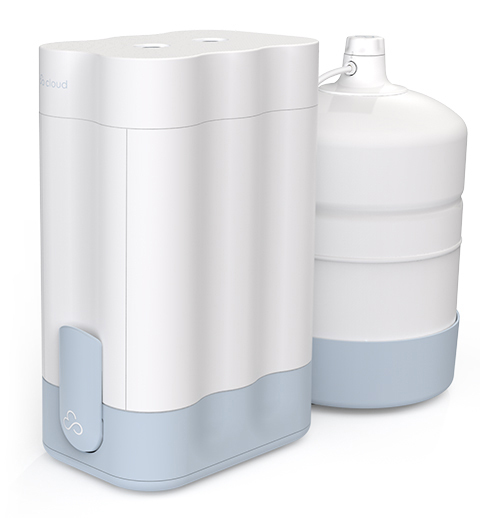Let's take a look at our first water type: alkaline water.
Did you know that alkaline water may have several health benefits?
But what is alkaline water exactly, and why is it so trendy?
"Alkaline water" refers to water that has a slightly basic pH level (not acidic).
The pH scale ranges between 1 and 14, with 1 being the most acidic, 14 being the most basic (alkaline), and 7 being neutral.
Most alkaline water has a pH of around 7.5 to 8.5.
Tap water, on the other hand, has a lower pH level and tends to be slightly acidic.
Research found that drinking alkaline water may help people with high blood pressure, diabetes, and cholesterol.
Other health advantages of alkaline water may include:
- Boosts antioxidant absorption
- Colon cleansing abilities
- Better hydration
- Stronger immune system
- Healthier skin
Please keep in mind that more clinical trials are needed before many of these health benefits can be confirmed in humans.
Is There Such a Thing as Drinking Too Much Alkaline Water?
No, you shouldn’t have to worry about drinking too much alkaline water, but there is such a thing as being too alkaline.
Luckily, excessive alkalinity, or hypocalcemia), is usually the result of a medical condition.
The most common cause of hypocalcemia is an underactive parathyroid gland that leads to high pH level in the blood.
An excess of alkalinity in the body can lead to gastrointestinal problems and skin irritations.
Too much alkalinity can also lead to metabolic alkalosis, a disease that can cause:
- Hand tremors
- Muscle twitching
- Nausea
- Vomiting
- Tingling in the extremities
Alkalosis may also induce a reduction in free calcium in the body, which can impact bone health.
Spring water is naturally-occurring alkaline water found underground.
It contains minerals that make it alkaline.
Depending on the source, spring water can have high concentrations of potassium, sodium, magnesium, calcium and more.
According to research, drinking magnesium and calcium-rich water may reduce the prevalence of heart disease and osteoporosis.
Many reputable spring water manufacturers offer low sodium or sodium-free products to avoid the potential complication of hypertension in sensitive populations.
Warnings About Spring Water
Because spring water is mainly untreated, it must be thoroughly tested for parasites, pollutants, and diseases like E. Coli and Giardia.
Use a reliable source and not confuse pure spring water with potentially dangerous or unregulated marketing designations such as “glacier” or “mountain” water.
Purified water is groundwater or tap water that has been treated to remove contaminants.
Many types of contaminants are eliminated during purification, including
- Parasites
- Bacteria
- Fungi
- Algae
- Metals like copper and lead
- Chemical pollutants
Tap water is usually safe to drink, but this water type may include trace contaminants depending on the source.
Commercially and at home, various methods are used to purify the water, but trace contaminants often sneak through.
Be Wary of Fluoride In Purified Water
While filtered water offers several health benefits, it may also have some risks.
Fluoride, for example, is a mineral added to public tap water sources to promote tooth health and minimize dental decay.
Although this method has reduced tooth decay in youngsters, fluoride levels that are too high can be hazardous to brain and nerve cells.
In fact, long-term fluoride exposure has been linked to learning, memory and cognitive deficiencies.
Coconut water isn’t exactly water, it’s more like a watery coconut juice, deliciously sweet and refreshing.
Coconuts are classified as a fruit and grow in tropical areas on trees technically designated as Cocos Nucifera.
A typical green coconut yields roughly ½ to 1 cup of coconut water.
Coconut water is 94% water and has very little fat.
So what does coconut water do for your body?
Despite being deliciously sweet…
Coconut water can reduce blood sugar levels and enhance other health indicators in diabetic animals.
A recent 2021 study on diabetic rats discovered that coconut water decreased blood glucose levels.
Another health benefit of coconut water is that it’s high in magnesium, which may improve insulin sensitivity in persons with type 2 diabetes and prediabetes.
The minerals in coconut water may also help treat kidney stones.
But, wait there, there's more…
Drinking coconut water can help reduce the risk of heart disease, like this animal study:
After 45 days, decreased cholesterol and triglyceride levels were shown, similar to the benefits of a cholesterol-lowering statin medication.
Can You Drink Too Much Coconut Water?
Because of its numerous health benefits, coconut water is the water type known as the "magic drink."
However, a few downsides to drinking coconut water may cause you to reconsider.
Coconut water may drop your blood pressure, induce an electrolyte imbalance, or serve as a laxative if you drink too much of it.
As a result, it is critical to be aware of the consequences of overindulging in this beverage.
On a daily basis, it’s probably better to stick to good ‘ol fashioned water instead.
Remember, There’s No One Size Fits All When It Comes to Water!
Surely you want the best water that Mother Earth has to offer, but don't sweat the small stuff…
Remember, the goal is to stay hydrated to keep your body functioning.
That’s the most important thing!
Whether you’re drinking alkaline, spring, purified, or coconut water, as long as your drinking water is safe and clean, you are good to go.
With that said, the highest quality water is reverse osmosis filtered, alkaline water.
Cloud Water Filters use the most advanced filtration technology to remove up to 99.9% of toxins and leave your water deliciously fresh.

